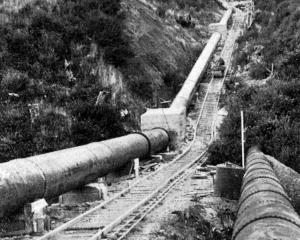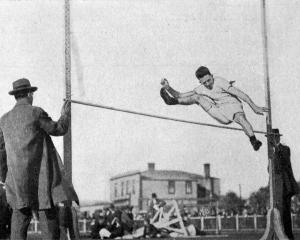
The Otago rugby team that defeated Canterbury 15-9 at Carisbrook. — Otago Witness, 15.8.1922
The game was played at a fast pace right through, but it was marred by a lot of faulty handling on both sides. It was, nevertheless, a fine game to watch, full of incident.
In the first half the play was fairly even, but in the second half the local side did most of the attacking. The Red forwards were faster than the Blue pack, and they kept together more in the loose rushes.
There was not, however, much to pick and choose between them in the scrum work. Dickson and Monro were the two best forwards on the Blues’ side, and Sonntag also played a fine game, especially on the line out.
Some of the Blue forwards require to put more dash into their play.
The Otago goal kicking was very poor. Five tries were scored — three between the posts — and each goal kick missed.
War: society was to blame
It is easy to agree that war is a curse and should be abolished. It is not so easy to come to agreement as to how this desirable state of things should be brought about.
The ‘No More War’ meeting in this city last week furnished an illustration in point.
There was unanimity in the condemnation of war, and discord respecting the causes of war and the means to secure the elimination of them.
By no stretch of imagination can it be suggested that the meeting was productive of a coherent pronouncement.
Starting off with an unexceptionable resolution emphasising, inter alia, the need for the perfecting of international organisation for the removal of the causes of war, for the settlement of disputes, and for the promotion of international co-operation, it wound up by passing a resolution declaring it to be impossible to do away with war without destroying the present system of society.
For the mere onlooker the situation probably had its amusing side.
The representatives of the local League of Nations Union who were present and addressed the meeting, seem, to put it plainly, to have been trapped into associating with a group of individuals whose interest in peace is that of the extreme Internationale, and whose objective is the destruction of the existing social fabric.
Sibling paper congratulated
On Friday of last week the Taranaki Herald, the evening newspaper published in New Plymouth, completed the seventieth year of its existence. With the exception only of the Lyttelton Times and the Otago Witness, it is the oldest newspaper in New Zealand.
Like them, it was founded largely upon faith in the development of the resources of the district in which it was established, for the population of the province of Taranaki in 1852 was less than 2000, and, like them also, it began its career as a weekly publication.
It was not until 1869, indeed, that the Taranaki Herald became a daily paper, and it is a noteworthy circumstance that during the whole period of its
existence as a daily it has been the property of one family, and it has had only two editors.
The Herald is to be congratulated upon the well-merited success which it has achieved.
— ODT, 10.8.1922












